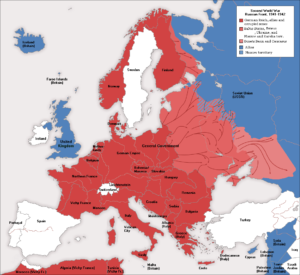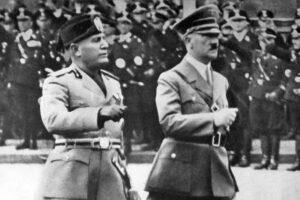
 When countries choose sides in a war, there isn’t normally much chance that they will switch sides, but that is exactly what happened to Romania…and in fact, there were four countries that switched sides in that war, so maybe it isn’t so uncommon after all. At the start of the war Romania was allied and Poland and pro-British. They were trying to stay neutral, but that wasn’t easy. As the war progressed, Romania became more and more concerned about being overrun by the Soviet Union and the Fascist elements already in Romania. Finally, the decision was made to adopt a pro-German dictatorship and became an ‘affiliate state’ of the Axis Powers. The Romanian government signed the Tripartite Pact in November 1940. During the time that Romania supported the Axis powers, they supplied Nazi Germany and the Axis armies with oil, grain, and industrial products. Also, numerous train stations in the country, such as Gara de Nord in Bucharest, served as transit points for troops departing for the Eastern Front.
When countries choose sides in a war, there isn’t normally much chance that they will switch sides, but that is exactly what happened to Romania…and in fact, there were four countries that switched sides in that war, so maybe it isn’t so uncommon after all. At the start of the war Romania was allied and Poland and pro-British. They were trying to stay neutral, but that wasn’t easy. As the war progressed, Romania became more and more concerned about being overrun by the Soviet Union and the Fascist elements already in Romania. Finally, the decision was made to adopt a pro-German dictatorship and became an ‘affiliate state’ of the Axis Powers. The Romanian government signed the Tripartite Pact in November 1940. During the time that Romania supported the Axis powers, they supplied Nazi Germany and the Axis armies with oil, grain, and industrial products. Also, numerous train stations in the country, such as Gara de Nord in Bucharest, served as transit points for troops departing for the Eastern Front.
With all of this, Romania caught the eye of the Allies in 1943, and soon became a target for their aerial bombardment. One of the most notable air bombardments was the attack on the oil fields of Ploie?ti on August 1, 1943, known as Operation Tidal Wave. On April 4 and 15, 1944, Bucharest was subjected to intense Allied bombardment. On August 23, 1944, King Michael I removed the government of Ion Antonescu and declared Romanian support to the Allies. Then the Luftwaffe bombed the city Bucharest on August 24 and 25, 1944 in direct response to the Romania’s decision to switch sides. Some experts believe that by switching sides Romania helped shorten the war by several months. I’m sure that Romania was glad to be on the winning side of the war.
Romania was not the only nation to switch sides in Worls War II. They were Bulgaria, Finland, and Italy. Bulgaria also signed the Tripartite Pact in March of 1941, but Finland never signed it, but was nonetheless a co-belligerent on the side of the Axis Powers. Finland signed the Anti-Comintern Pact, an anti-communist agreement of mainly fascist powers, in November 1941. Italy had its own imperial ambitions, which were partly 
 based on the Roman Empire and similar to the German policy of lebensraum, which clashed with those of Britain and France. No matter wat their aspirations were, all of these nations decided that the ways of Germany and Hitler were simply not ways they could live with, so they switched sides, joined the Allied Nations, further weakened Hitler to the point of causing his demise.
based on the Roman Empire and similar to the German policy of lebensraum, which clashed with those of Britain and France. No matter wat their aspirations were, all of these nations decided that the ways of Germany and Hitler were simply not ways they could live with, so they switched sides, joined the Allied Nations, further weakened Hitler to the point of causing his demise.


Leave a Reply